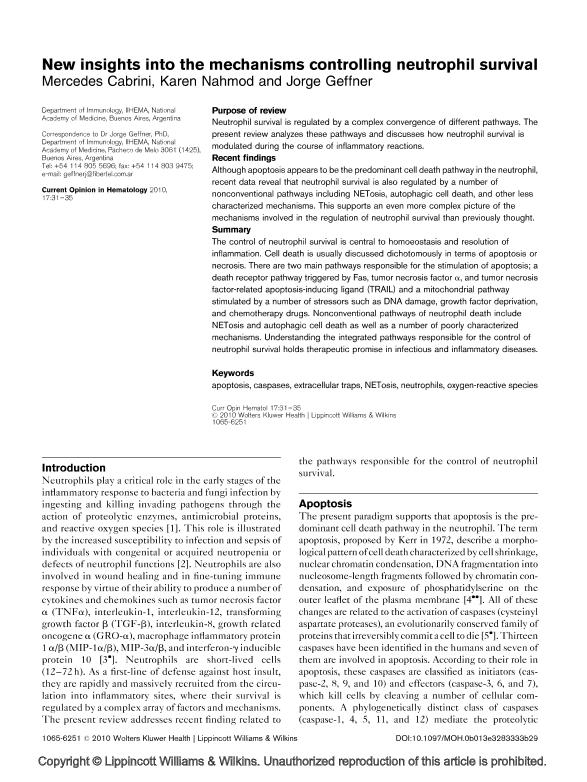Mostrar el registro sencillo del ítem
dc.contributor.author
Cabrini, Mercedes
dc.contributor.author
Nahmod, Karen Amelia

dc.contributor.author
Geffner, Jorge Raúl

dc.date.available
2019-01-07T19:28:52Z
dc.date.issued
2010-01
dc.identifier.citation
Cabrini, Mercedes; Nahmod, Karen Amelia; Geffner, Jorge Raúl; New insights into the mechanisms controlling neutrophil survival; Lippincott Williams; Current Opinion in Hematology; 17; 1; 1-2010; 31-35
dc.identifier.issn
1065-6251
dc.identifier.uri
http://hdl.handle.net/11336/67603
dc.description.abstract
Purpose of review: Neutrophil survival is regulated by a complex convergence of different pathways. The present review analyzes these pathways and discusses how neutrophil survival is modulated during the course of inflammatory reactions. Recent findings: Although apoptosis appears to be the predominant cell death pathway in the neutrophil, recent data reveal that neutrophil survival is also regulated by a number of nonconventional pathways including NETosis, autophagic cell death, and other less characterized mechanisms. This supports an even more complex picture of the mechanisms involved in the regulation of neutrophil survival than previously thought. Summary: The control of neutrophil survival is central to homoeostasis and resolution of inflammation. Cell death is usually discussed dichotomously in terms of apoptosis or necrosis. There are two main pathways responsible for the stimulation of apoptosis; a death receptor pathway triggered by Fas, tumor necrosis factor α, and tumor necrosis factor-related apoptosis-inducing ligand (TRAIL) and a mitochondrial pathway stimulated by a number of stressors such as DNA damage, growth factor deprivation, and chemotherapy drugs. Nonconventional pathways of neutrophil death include NETosis and autophagic cell death as well as a number of poorly characterized mechanisms. Understanding the integrated pathways responsible for the control of neutrophil survival holds therapeutic promise in infectious and inflammatory diseases.
dc.format
application/pdf
dc.language.iso
eng
dc.publisher
Lippincott Williams

dc.rights
info:eu-repo/semantics/openAccess
dc.rights.uri
https://creativecommons.org/licenses/by-nc-sa/2.5/ar/
dc.subject
Apoptosis
dc.subject
Caspases
dc.subject
Extracellular Traps
dc.subject
Netosis
dc.subject
Neutrophils
dc.subject
Oxygen-Reactive Species
dc.subject.classification
Otras Medicina Básica

dc.subject.classification
Medicina Básica

dc.subject.classification
CIENCIAS MÉDICAS Y DE LA SALUD

dc.title
New insights into the mechanisms controlling neutrophil survival
dc.type
info:eu-repo/semantics/article
dc.type
info:ar-repo/semantics/artículo
dc.type
info:eu-repo/semantics/publishedVersion
dc.date.updated
2019-01-07T13:32:16Z
dc.journal.volume
17
dc.journal.number
1
dc.journal.pagination
31-35
dc.journal.pais
Estados Unidos

dc.description.fil
Fil: Cabrini, Mercedes. Academia Nacional de Medicina de Buenos Aires. Instituto de Investigaciones Hematológicas "Mariano R. Castex"; Argentina
dc.description.fil
Fil: Nahmod, Karen Amelia. Academia Nacional de Medicina de Buenos Aires. Instituto de Investigaciones Hematológicas "Mariano R. Castex"; Argentina. Consejo Nacional de Investigaciones Científicas y Técnicas; Argentina
dc.description.fil
Fil: Geffner, Jorge Raúl. Academia Nacional de Medicina de Buenos Aires. Instituto de Investigaciones Hematológicas "Mariano R. Castex"; Argentina. Consejo Nacional de Investigaciones Científicas y Técnicas; Argentina
dc.journal.title
Current Opinion in Hematology

dc.relation.alternativeid
info:eu-repo/semantics/altIdentifier/doi/http://dx.doi.org/10.1097/MOH.0b013e3283333b29
dc.relation.alternativeid
info:eu-repo/semantics/altIdentifier/url/https://insights.ovid.com/crossref?an=00062752-201001000-00007
Archivos asociados
